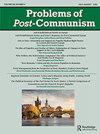Coronavirus Conspiracy Theories in Southeast Europe: (Non-)Believers, Social Network Bubbles, and the Discourse of Blame
IF 2
2区 社会学
Q2 POLITICAL SCIENCE
引用次数: 0
Abstract
ABSTRACT Using survey and social network evidence from Southeast Europe, we advance the understanding of conspiracy theories and politics related to the coronavirus pandemic in three ways: (1) we show that beliefs in coronavirus conspiracy theories are related to ideological support for a nationalist vision of society and socialist vision of the economy; (2) we also show that both conspiracy believers and nonbelievers are living in bubbles of the like-minded; and (3) we use the tools of natural language processing to elucidate the unambiguous differences in the discourse related to the coronavirus used by conspiracy believers and nonbelievers.东南欧的冠状病毒阴谋论:(非)信徒、社交网络泡沫和指责话语
本文章由计算机程序翻译,如有差异,请以英文原文为准。
求助全文
约1分钟内获得全文
求助全文
来源期刊

Problems of Post-Communism
POLITICAL SCIENCE-
CiteScore
4.00
自引率
12.50%
发文量
33
期刊介绍:
The post-communist countries are the most rapidly changing societies of Europe and Asia. For insight into this twenty-first century revolution, there is no better source than Problems of Post-Communism. Emphasis is placed on timely research covering current economic, political, security, and international developments and trends in Russia and China, Central Europe and Central Asia, Latin America, and Southeast Asia. Clarity and readability make the articles fully accessible to researchers, policy makers, and students alike.
 求助内容:
求助内容: 应助结果提醒方式:
应助结果提醒方式:


